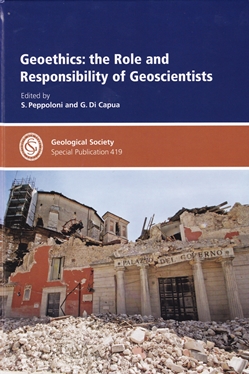 Geoethics.org defines geoethics as dealing 'with the ethical, social and cultural implications of Earth Sciences education, research and practice, and with the social role and responsibility of geoscientists in conducting their activities'. The 21 papers in this book address the interaction between geologic processes, geoscientists, the general public, and decision makers. Most papers present geohazard examples but groundwater, oil and gas development, geotourism, geoheritage siting, and geoeducation issues are included. Communication or, more commonly, the lack of effective communication between geoscientists, the general public, and decision makers is an appropriately common theme in the book, with a particular focus on effectively communicating the risk that a geologic event will occur within a specified time frame.
Geoethics.org defines geoethics as dealing 'with the ethical, social and cultural implications of Earth Sciences education, research and practice, and with the social role and responsibility of geoscientists in conducting their activities'. The 21 papers in this book address the interaction between geologic processes, geoscientists, the general public, and decision makers. Most papers present geohazard examples but groundwater, oil and gas development, geotourism, geoheritage siting, and geoeducation issues are included. Communication or, more commonly, the lack of effective communication between geoscientists, the general public, and decision makers is an appropriately common theme in the book, with a particular focus on effectively communicating the risk that a geologic event will occur within a specified time frame.
While geoethics may address the intersection of geoscience, sociology, politics, and human welfare, geoscientists are not experts in all these areas. Item 9 of GSL’s Code of Conduct states, “Fellows must not presume to be experts in fields other than their own, or accept professional obligations that they are not competent to discharge.” D. Albarello’s paper on communicating uncertainty makes an important ethical point. As geoscientists, we should effectively communicate the probabilities of an event occurring. Thus we are effectively the bookmakers. But we are not the policy makers deciding what the public should do. We should not place the bets. Doing so, or being viewed as having done so, leads to the legal troubles of the seismologist defendants in the L’Aaquila trial, the subject of another paper in the book.
One of the major failings of papers in this book is the lack of discussion of basic geoscientific ethical principles that would provide an ethical foundation for the topics covered. GSL was a participant in the development of (and is a signatory to) the 2015 AGI Guidelines for Ethical Professional Conduct. Sadly, neither these nor any other guidelines are cited as an ethical foundation. We must remember that ethics are not necessarily the equivalent of whatever concept someone views as good. Nor is ethical analysis always able to arrive at a unique answer. Instead we must agree to disagree and respect that the other side has a sound ethical basis for its opposing position. Despite this lack of ethical foundation, this book provides important case histories and guidance for geoscientists operating at the intersection of geoscience, the public, and decision makers.
Reviewed by David M. Abbott, Jr.
GEOETHICS: THE ROLE AND RESPONSIBILITY OF GEOSCIENTISTS by S. Peppoloni (Editor), G. Di Capua (Editor), Published by the Geological Society of London, Special Publication 419, Hardback, ISBN 978-1-86239-726-2, Publication Date: August 2015. List price: £85.00 (Fellows £42.50) www.geolsoc.org